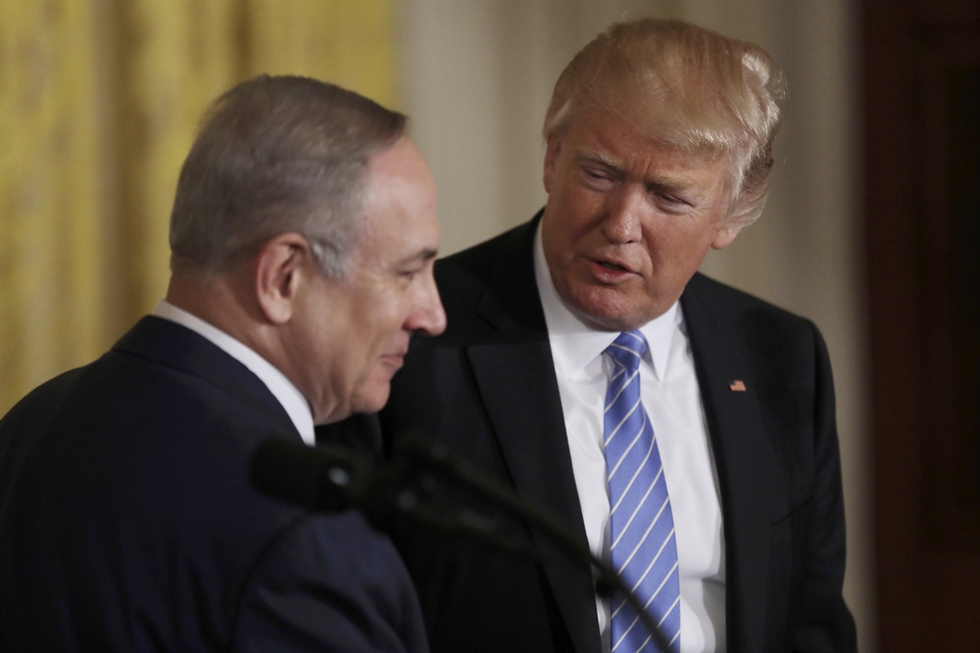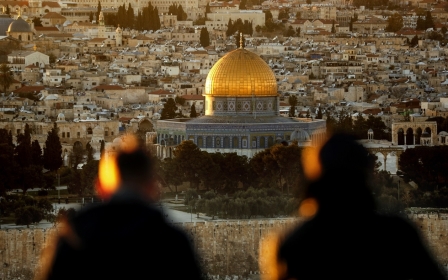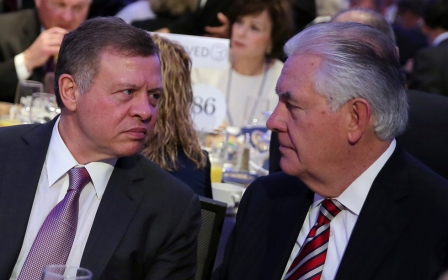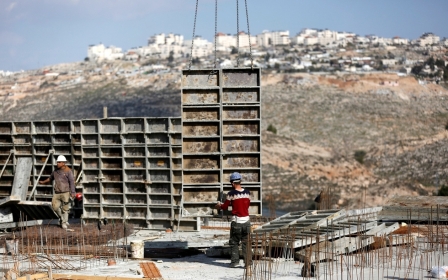Trump throws Palestinian future into doubt by wavering on two-state solution

The goal of an independent Palestinian state in the West Bank was thrown into confusion on Wednesday as Donald Trump said he was neither committed to its existence nor against a "one-state solution" to the Israeli-Palestinian conflict.
At a news conference at the White House with Israeli Prime Minister Benjamin Netanyahu, the US president said he was committed to a "really great" peace deal, but failed to give any commitment when asked what form that deal should take.
"The United States will encourage a really great peace deal. It is the parties themselves that must directly negotiate. Both sides will have to make compromises," said Trump.
I'm looking at two-state and one-state and I like the one that both parties like. I can live with either.
Donald Trump
Asked if he was moving away from endorsing a two-state solution, Trump said: "I'm looking at two-state and one-state and I like the one that both parties like. I'm very happy with the one that both parties like.
"I can live with either one. I thought for a while it looked like the two-state, looked like it may be the easier of the two, but honestly if Bibi [Netanyahu] and the Palestinians and Israel are happy, I am happy with the one they like the best."
An Israel-Palestine peace deal has for decades been predicated on agreeing to the creation of a Palestinian state to live beside Israel as an independent nation. However, the White House under Trump has indicated it is no longer committed to it as a de-facto solution.
Trump's words echoed those of a White House official speaking on condition of anonymity, who said that a two-state agreement "that doesn't bring peace is not a goal that anybody wants to achieve".
"Peace is the goal, whether that comes in the form of a two-state solution if that's what the parties want, or something else if that's what the parties want."
Netanyahu said that he did not want to see a two-state solution that would give rise to a "terrorist, Islamic dictatorship".
"What does Abu Mazen [Mahmoud Abbas, the Palestinian president] mean by two states? What are we talking about? Costa Rica or another Iran?"
Netanyahu said "radical Islamic terror" was the gravest threat to his nation, and that for any peace deal to be successful, Palestinians must recognise the "Jewish state" and end their calls for Israel's destruction.
"Two pre-requisites: recognition of the Jewish state, and Israel's security west of the Jordan river," he said.
He claimed the issue of illegal settlements in the West Bank was not the "core" of the conflict. Israel has recently passed a law that effectively endorses settlements under Israeli statute.
The settlements are illegal under international law.
Naftali Bennett, Netanyahu's far-right education minister, praised Trump's refusal to commit to a two-state solution.
"A new era. New ideas. No need for 3rd Palestinian state beyond Jordan & Gaza. Big day for Israelis & reasonable Arabs. Congrats," he said on Twitter in English.
In Hebrew, he said: "After 24 years, the Palestinian flag has come down from the mast and the Israeli flag has taken its place," alluding to the 1993 Oslo accords which promised to establish an independent Palestinian state.
Abbas fuels Sinai settlement speculation
The news conference came as reports from Israel had suggested the Palestinian president had rejected an offer by Egypt to resettle his people in land in the Sinai peninsula and annex that to the Gaza Strip - another suggestion that a two-state solution based on Palestinian land in the West Bank was no longer being considered.
Speaking to a gathering of his Fatah party in Ramallah on Sunday, Abbas said that an unidentified senior Egyptian official had recently suggested the idea, which was originally proposed by former Israeli national security adviser Giora Eiland.
"They [the Egyptians] are prepared to receive all the refugees, [saying] 'let’s end the refugee story'," Abbas was quoted by Maan news agency as saying.
Abbas told the crowd that if Israel had its way, Gaza would become the Palestinian state while the West Bank would remain under Israeli influence.
Trump meanwhile said that he would "love to see" the US embassy move from Tel Aviv to Jerusalem - a plan that has attracted great criticism from Muslim leaders and Palestinians as itself endangering the two-state solution. Palestinians want East Jerusalem to form the capital of their future state.
"We are looking at it with great care, believe me. We'll see what happens," Trump said.
He added that Palestinians must stop teaching their children "tremendous hate" towards Israel.
"I have seen what they are taught. It starts at a very early age, it starts in the school room. They have to acknowledge a very great country.
"I want the Israeli people to know the US stands with Israel against terrorism. Peace requires nations to uphold the dignity of human life and be a voice for all of those who are endangered and forgotten."
He also said Israel was unfairly targeted at the UN and by boycotts that target Israel.
On other matters, the US president said that Israel's "security challenges are enormous, including Iran's nuclear ambitions", adding that the Iran nuclear deal was "one of the worst deals I've ever seen".
"I will do more to prevent Iran from ever developing a nuclear weapon. I mean ever."
Abbas speaks out
After Trump met with Netanyahu, Abbas issued a statement demanding a halt to Israeli settlement expansion in occupied territory. It added that he was committed to a two-state solution to the conflict with Israel.
Abbas said he agreed with Trump's call for Israel to refrain from settlement building in the occupied West Bank and East Jerusalem.
"The presidency demands that (Israel) agree to (Trump's call), and that of the international community, to halt all settlement activities including in occupied East Jerusalem," the statement said.
Abbas's statement added that the Palestinians affirmed their "readiness to deal positively with the Trump administration to make peace". Talks have been frozen since 2014.
The Palestinians seek to establish an independent state in the Israeli-occupied West Bank, territory captured in the 1967 Middle East war and the Gaza Strip, which is controlled by Hamas, with East Jerusalem as its capital.
New MEE newsletter: Jerusalem Dispatch
Sign up to get the latest insights and analysis on Israel-Palestine, alongside Turkey Unpacked and other MEE newsletters
Middle East Eye delivers independent and unrivalled coverage and analysis of the Middle East, North Africa and beyond. To learn more about republishing this content and the associated fees, please fill out this form. More about MEE can be found here.





